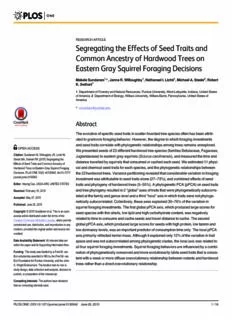
Segregating the Effects of Seed Traits and Common Ancestry of Hardwood Trees on Eastern Gray ... PDF
Preview Segregating the Effects of Seed Traits and Common Ancestry of Hardwood Trees on Eastern Gray ...
RESEARCHARTICLE Segregating the Effects of Seed Traits and Common Ancestry of Hardwood Trees on Eastern Gray Squirrel Foraging Decisions MekalaSundaram1*,JannaR.Willoughby1,NathanaelI.Lichti1,MichaelA.Steele2,Robert K.Swihart1 1 DepartmentofForestryandNaturalResources,PurdueUniversity,WestLafayette,Indiana,UnitedStates ofAmerica,2 DepartmentofBiology,WilkesUniversity,Wilkes-Barre,Pennsylvania,UnitedStatesof America * [email protected] Abstract Theevolutionofspecificseedtraitsinscatter-hoardedtreespeciesoftenhasbeenattrib- utedtogranivoreforagingbehavior.However,thedegreetowhichforaginginvestments andseedtraitscorrelatewithphylogeneticrelationshipsamongtreesremainsunexplored. OPENACCESS Wepresentedseedsof23differenthardwoodtreespecies(familiesBetulaceae,Fagaceae, Citation:SundaramM,WilloughbyJR,LichtiNI, Juglandaceae)toeasterngraysquirrels(Sciuruscarolinensis),andmeasuredthetimeand SteeleMA,SwihartRK(2015)Segregatingthe distancetravelledbysquirrelsthatconsumedorcachedeachseed.Weestimated11physi- EffectsofSeedTraitsandCommonAncestryof HardwoodTreesonEasternGraySquirrelForaging calandchemicalseedtraitsforeachspecies,andthephylogeneticrelationshipsbetween Decisions.PLoSONE10(6):e0130942.doi:10.1371/ the23hardwoodtrees.Variancepartitioningrevealedthatconsiderablevariationinforaging journal.pone.0130942 investmentwasattributabletoseedtraitsalone(27–73%),andcombinedeffectsofseed Editor:HepingCao,USDA-ARS,UNITEDSTATES traitsandphylogenyofhardwoodtrees(5–55%).AphylogeneticPCA(pPCA)onseedtraits Received:February19,2015 andtreephylogenyresultedin2“global”axesoftraitsthatwerephylogeneticallyautocorre- latedatthefamilyandgenuslevelandathird“local”axisinwhichtraitswerenotphyloge- Accepted:May27,2015 neticallyautocorrelated.Collectively,theseaxesexplained30–76%ofthevariationin Published:June25,2015 squirrelforaginginvestments.ThefirstglobalpPCAaxis,whichproducedlargescoresfor Copyright:©2015Sundarametal.Thisisanopen seedspecieswiththinshells,lowlipidandhighcarbohydratecontent,wasnegatively accessarticledistributedunderthetermsofthe relatedtotimetoconsumeandcacheseedsandtraveldistancetocache.Thesecond CreativeCommonsAttributionLicense,whichpermits unrestricteduse,distribution,andreproductioninany globalpPCAaxis,whichproducedlargescoresforseedswithhighprotein,lowtanninand medium,providedtheoriginalauthorandsourceare lowdormancylevels,wasanimportantpredictorofconsumptiontimeonly.ThelocalpPCA credited. axisprimarilyreflectedkernelmass.Althoughitexplainedonly12%ofthevariationintrait DataAvailabilityStatement:Allrelevantdataare spaceandwasnotautocorrelatedamongphylogeneticclades,thelocalaxiswasrelatedto withinthepaperanditsSupportingInformationfiles. allfoursquirrelforaginginvestments.Squirrelforagingbehaviorsareinfluencedbyacombi- Funding:ThisstudywasfundedbyaFredM.van nationofphylogeneticallyconservedandmoreevolutionarilylabileseedtraitsthatisconsis- EckscholarshipawardedtoMSbytheFredM.van tentwithaweakormorediffusecoevolutionaryrelationshipbetweenrodentsandhardwood EckFoundationforPurdueUniversity,andtheJohn treesratherthanadirectcoevolutionaryrelationship. S.WrightEndowment.Thefundershadnorolein studydesign,datacollectionandanalysis,decisionto publish,orpreparationofthemanuscript. CompetingInterests:Theauthorshavedeclared thatnocompetinginterestsexist. PLOSONE|DOI:10.1371/journal.pone.0130942 June25,2015 1/16 Phylogenetic&EcologicalDeterminantsofGraySquirrelForaging Introduction Scatter-hoardingrodentsinfluenceseedlingestablishmentinmanycommunitiesbyactingas seeddispersalagentsandseedpredators[1,2].Whereasmostseedsharvestedbyrodentsare ultimatelyconsumed[1,3],manyrodentsenhancetheprobabilityofgerminationandestab- lishmentbycachinginsuitablemicrosites[4]andthensubsequentlyfailingtorecoverapor- tionoftheseseeds[1,5].Mostrodentscantherefore,easilyshiftfrommutualismtoseed predation,andthisconditionalnatureofmutualismbetweenseed-bearingtreesandscatter- hoardersisadelicateone[1]thatoftenfollowsfromtherodents’responsestoseedcharacteris- tics[2,6]. Fromtheperspectiveofarodent,seedpreferenceandseedhandlinginvolveasequenceof behavioraldecisions.Ateachstepintheprocess,scatter-hoarderspresumablyevaluatecosts andbenefitsassociatedwithalternativestomaximizeuseofresources[7,8].Experimentswith artificialandnaturalseedssuggestthatseeddispersalandhandlingbehaviorisrelatedtothe perceivedvalueofaseed,orthebenefitsofattractivetraitsdiscountedbythecostsleviedby defensiveseedtraits[8,9].Whilenumerousstudieshavefocusedontherelationshipbetween seedtraitsandfate,fewerhaveexaminedtheinfluenceofseedtraitsonthespecificbehavioral decisionsofthescatterhoarder[10,11].Fine-scaleassessmentsoftheseedhandlingprocess provideevidencethatrodentsevaluatetheconditionofseeds(e.g.bypawmanipulationin Sciurusniger),whichmaybepredictedbytraitsindicatingseedqualityorcondition[11]. Fromtheperspectiveofatree,someseedtraitsmayimprovetheprobabilityofbeingcached orconsumed,therebyinfluencingfitness[12].Creatinganattractiveseed(e.g.,withahigh caloricvalue)incomparisontothatofcompetitorsisbeneficialbecausesuchseedsmaybedis- persedlongerdistances[13,14,15]reducingdensity-dependentmortalityfromseedlingcom- petitorsorseedpredation[16–18].Ontheotherhand,aseedwithdefensivetraitssuchasa hardshellmaybebeneficialbecausesuchseedsincreasehandlingcostsandinduceseedcach- ingbehaviorstherebyincreasingseedsurvival[10,19–22].SeedsofhardwoodtreesinChina, forexample,showtrade-offswithrespecttoinvestmentinseedtraitsthatlikelyinfluencehan- dlingcostsandseeddispersal[12]. Observationsofseedhandlingandseedchemistryprovideabundantevidenceforreciprocal evolutionaryeffectsbetweenrodentsandwoodyplants[23].Intreesquirrels,suitesofbehav- ioraladaptationsandmorphologicaladaptationshaveresultedfromselectivepressuresassoci- atedwithseedmorphologyandchemistry[23].Forexample,gradientsoftannin concentrationshavebeenobservedinoakkernels,whichimpartphysiologicalandmetabolic coststorodentsandresultinportionsofkernelsbeingrejected[24–27].Inresponse,some rodentshaveadaptedtodetoxifytannins[28,29],andmanycacheacornswithhightannin concentrationsmorefrequently,possiblytoavoidordelaythecostsassociatedwithingesting tannins[30,31].Intrees,changesinseedchemistryandmorphologyhaveevolvedinresponse topredationanddispersalpressuresexertedbytreesquirrels[23].Forinstance,whiteoak seedsshownodormancyandmultiple-seededacornspossiblytominimizelengthofexposure topredationandescapemortalityfromembryo-excisionbehaviorsbyeasterngraysquirrels [31,32].Thusfarallapproachestorodent-treecoevolutionhavecollectedsomecombinationof detailedmorphological,physiological,behavioral,andbiogeographicdata[23].Whilethese studiessuggestthatcoevolutionaryinteractionsexistbetweengranivorousrodentsandhard- woodtrees,thestrengthofthisinteractionisvariable[23]. Coevolutionaryrelationshipsbetweenplantsandseeddispersershavebeendescribedacrossa continuum,rangingfromstrong,pairwiseinteractionstoweak,diffuseinteractions.Pairwise coevolutionoccursbetweenspecificspeciesandleadstostrongselectivepressuresontraits[33]. Recentobservationsofacorn(Quercusspp.)embryoexcisionbehaviorshownbynaïvesquirrels PLOSONE|DOI:10.1371/journal.pone.0130942 June25,2015 2/16 Phylogenetic&EcologicalDeterminantsofGraySquirrelForaging (Sciuridaespp.;[31,32])isanexampleofabehavioraladaptationandsuggestsastrongandper- hapspairwisecoevolutionaryrelationshipbetweenoaksandsquirrels[31,34].Incontrast,weak selectivepressuresduetodisparitiesinevolutionaryratesofwoodyspeciesandanimaldispers- ers,unpredictabilityofconditionsforseedgermination,andaplethoraofotherfactorsleadsto diffuseorweakcoevolution[35,36]. Tobetterunderstandthenatureofcoevolutionaryinteractionsbetweenhardwoodtree seedsandsquirrels,weusedacombinationofphylogeneticandecologicalmethodstodeter- minehowseedcachingandseedconsumptionbehaviorsofeasterngraysquirrels(Sciuruscar- olinensis)variedasafunctionofseedtraitsandphylogeneticrelationshipsof23hardwood treesspecies.Specifically,wehypothesizedthatgraysquirrelswouldinvestmoretimeand travellongerdistancestoconsumeandcacheseedswithstrongphysicaldefensesandhigh nutrientvalues.Inaddition,wepredictedthatconspecificinterferencewouldberelatedto physicaldefensesofaseedandnutrientvalueofaseed.Weincorporatedphylogeneticrelation- shipsofhardwoodtreesintoouranalysestoevaluatetherelativeproportionofgraysquirrel seedhandlingbehaviorsthatisinfluencedbycommonancestryofhardwoodtreespeciesand todeterminewhichphylogeneticallyrelatedseedtraitsinfluencehandling.Wehypothesized thatifstrongcoevolutionaryrelationshipsoccurbetweengraysquirrelsandhardwoodtreespe- cies,mostofthevariationingraysquirrelbehaviorwouldbeexplainedbyseedtraitswith strongphylogeneticsignals.However,weaker,morediffusecoevolutionaryrelationships wouldbeexplainedbyamixofseedtraitswithastrongphylogeneticsignalandthosetraits withnophylogeneticsignal.Finally,ifnocoevolutionaryrelationshipsoccur,phylogenetically conservedtraitsshouldexplainasmallportionofthevariationingraysquirrelbehavior. MaterialsandMethods Seedhandlingmetrics Free-rangingeasterngraysquirrelsonthecampusofPurdueUniversitywerepresentedwitha sequenceofseedtypesinpseudo-randomorderbetween1October2011and15February2012. Seedswereobtainedfromcommercialseedcompanies(F.W.SchumacherCo.,EastSandwich, MAandSheffield’sseedCo.,Locke,NY)andfrombeneathtreesoncampus.Seedswerestored at4°C,separatedbyspeciesinplasticcontainers.Seedpresentationswereconductedbytossing aseedtoasquirrelfrom1–4m.Ifthesquirrelretrievedtheseed,theobservervideorecorded theeventuntiltheseedwasconsumedorcached.Whentheseedwasconsumed,theobserver recoveredtheremainsoftheseedkernelandshellbysiftingthroughthelitterandsoil.Thedis- tanceasquirrelmovedtocacheorconsumeaseedwasdeterminedbyretracingthepathofthe squirrel,markingthefinaldestination,andthenmeasuringthestraight-linedistancebetween thepointofencounteroftheseedandthefinallocation.Ifthedistancetravelledwastoogreat tobeaccuratelyestimatedwithatapemeasure,aGPS(GarminModelNo.72)wasusedto obtaincoordinates.Straight-linedistancewasthencalculatedinArcGIS10(EnvironmentalSys- temsResearchInstitute2010).Asecondseedwaspresentedtoasquirrelonlyafterthefirstseed washandled,andtheprocessrepeateduntilsquirrelsnolongerrecoveredseeds.Presentations ofthesameseedtypeswerespatiallyseparatedbyselectinglocationsthatwere>100mapart toincreasethelikelihoodthatdatawerecollectedfromdifferentsquirrels.Exceptionswereper- mittedonlyiftwodifferentsquirrelscouldberecordedsimultaneously.Theprotocolincluded non-intrusiveobservationwithnohindrancetotheanimals,andtherefore,wedidnotseek additionalapprovalfromPurdueAnimalCareandUseCommittee(PACUC). Foragingtrialvideoswerecollectedfor23seedtypesfromthetreefamiliesBetulaceae,Faga- ceae,andJuglandaceae(S1Table).Thetimetakentoconsumeorcacheeachseedwascalcu- latedfromthevideos.Timerequiredtoconsumeandcacheaseedwasdefinedasthetime PLOSONE|DOI:10.1371/journal.pone.0130942 June25,2015 3/16 Phylogenetic&EcologicalDeterminantsofGraySquirrelForaging neededtoconsumeandcompletelyburyaseedrespectively,anddidnotincludetraveltime. Wequantifiedthenumberofrecordedtrialsperseedtypeinwhichthefocalsquirrelwas chasedbyaconspecificwhilehandlingaseed,whichwedefineasconspecificinterference[37]. Seedtraits Thevalueofeachseedtraitwasmeasuredfor3seedsforeachofthe23seedtypesunlessspeci- fiedotherwise(S2Table).Percentageofmoistureinseedswascalculatedbydryingsamplesat 103°Cfor3days.Percentageoftannicacidequivalentsinnutmeatwasdeterminedbyperform- ingradialdiffusionassays[38,39].Thevaluewasexpressedastannicacidequivalentsoccurring in100gramsofdrynutmeat.Energycontentofthenutmeatwasobtainedinabombcalorime- ter(PARR1262bombcalorimeter,ParrInstrumentCo.,Moline,IL)usingbenzoicacidasa calibrationstandard.Thevaluewasadjustedtoobtaincaloriespergramofdryweight.Seed hardnesswasestimatedasthepeakload(kilograms)requiredtobreakaseed’sshellandpierce thenutmeat.TestingwasdonewithaMTS/Sintechcomputerizedtestingmachine(MTSCor- poration,EdenPrairie,MN)usingacrossheadfashionedaftertheskullofaneasterngray squirrelanddesignedtomimicasquirrel’sincisoraction(S1Fig).Onlytheupperincisors wereusedtoobtainhardnessestimates.Peakloadwithin5mmcrossheaddisplacementwas sufficienttobreaktheseedshellofmostseedsandwasusedasanestimateofseedhardness. Onlybutternut(Juglanscinerea)seedshellswerenotpiercedwiththe5mmcrosshead;there- fore,10mmdisplacementwasemployedforthisseed.Seedshellthicknesswasdeterminedby visualizingthecrosssectionofseedshellswithastereoscopicmicroscopeattachedtoaNikon ImagingSystemat4.91micrometersperpixel.Proximateanalysiswasperformedfollowing AssociationofOfficialAnalyticalChemists(AOAC)protocolstoestimatepercentageofcrude proteins(Kjeldahl,AOACOfficialMethod984.13A-D,2006),fats(etherextraction,AOAC OfficialMethod920.39A,2006)andcarbohydrates(differencemethod,FAO2003)innut- meat.Wecombinedkernelsfrommultipleseedstoobtainatleast10gofdriedmaterial,and duplicatesampleswereusedinproximateanalysesforeachseedtype.Finally,weusednumber ofdaysofcoldstratificationrequiredbeforegerminationinachamberasanindexofdormancy periodofseedtypes.Estimatesofcoldstratificationdayswereobtainedfromtheliterature [40–42],andaverageswerecomputedandusedwheneverarangeofdayswasprovided. Molecularandphylogeneticmethods Weconductedaphylogeneticanalysistoestimateandincorporateevolutionaryrelationships betweenhardwoodtreespeciesintoanalysesinthisstudy.Toachievethisgoal,wefirst extractedDNAfromplanttissueusingtwomethods.Forthemajorityofspecies,weextracted DNAfromleaftissueusingaphenol-chloroformprotocol[43],modifiedbygrindingfreshleaf tissuewith500mgPVPPinliquidnitrogen[44].WeusedthePowerPlantProDNAIsolation Kit(MoBioLaboratories,Inc;Carlsbad,CA)toextractDNAfromCaryatomentosaleaftissue andembryosremovedfromtheseedsofQuercusprinusandQuercusbicolor. Tocreateaphylogenyforour23hardwoodtreespecies,weusedsequencedatafromtwo chloroplastgenes-ribulose-bisphosphatecarboxylaseoxygenaselargesubunit(rbcL)and maturaseK(matK)aswellaportionofthenucleargenomethatincludedtheinternaltran- scribedspacer1,5.8SrRNAgene,andtheinternaltranscribedspacer2(ITS).Whenpossible, weobtainedrelevantsequencesfromGenbank(S6Table).Fortheremainingspecies,we sequencedeachsampleusingpolymerasechainreaction(PCR)onanEppendorfMastercycler (Eppendorf,Westbury,NewYork).Initialamplificationwasperformedin20μLreactionscon- tainingapproximately40ngtemplateDNA,1unitofNEBTaqpolymerase,0.3lMofeach primer,1.5mMMgCl2,10mMTris-HCl,50mMKCl,0.5mg/mlBSA,and0.2mMofeach PLOSONE|DOI:10.1371/journal.pone.0130942 June25,2015 4/16 Phylogenetic&EcologicalDeterminantsofGraySquirrelForaging dNTP.PCRparametersincludedaninitialdenaturingtemperatureof95°Cfor30secondsfol- lowedby30cyclesof95°Cfor30secondsdenaturing,annealingtemperatureof53°CforrbcL andmatK[45]and58°CfortheITSgene(primersITS5andITS4;[46]),and72°Cfor1minute elongation,withafinalelongationtemperatureof72°Cfor5minutes.Wecleanedtheresulting PCRproductwiththeMinElutePCRPurificationKit(Qiagen,Valencia,California).Sanger sequencingreactionswereperformedat10μLandcontained50ngoftemplateandBigDye 3.1.WeusedanABIPrism3730XLsequencer(AppliedBiosystems,FosterCity,CA,USA)and trimmedsequencesinSequencher4.7(GeneCodesCorp.,AnnArbor,MI). WealignedthesequencesforeachgeneusingM-coffeewebserverhostedbytheCentrefor GenomicRegulation[47,48].Wetestedforcongruenceofspeciespairwisedistancematrices derivedforthe3alignedgenesinthisstudybycalculatingKendall’sWstatisticofconcordance asimplementedbythefunction‘CADM’withinthepackage‘ape’inR[49].Afterrejectingthe nullhypothesisofincongruencebetweendistancematrices,weconcatenatedsequencesofthe 3genesforfurtheranalyses.Thefunction‘modelTest’inthepackage‘phangorn’wasusedto selectthebestnucleotidesubstitutionmodelfortheconcatenatedsequences[50].ModelSYM (symmetricalmodel;[51])+G(gammadistributedratevariation)wasselectedbasedonBIC values. Wegeneratedaphylogenyforour23speciesusingtheprogramBEAST[52],andprepared ourinputfileusingBEAuti[53].Weusedarelaxedlognormalmolecularclock[54],theYule speciationmodel[55,56],andRubusoccidentalisasanoutgroup.Weran5independentruns of50millionsteps,thinningtoevery1000trees.Weconfirmedconvergenceofeachrunwith Tracer,andfilteredthefirst10%eachgroupofrunsusingTreeAnnotator. Statisticalanalyses WeestimatedpairwiseSpearmanrank-correlationsbetweentheseedhandlingmetricsandall seed-traitvaluesinthisstudy.WealsocomputedMoran’sImetricofphylogeneticsignal[57] forallseedtraitsandevaluatedsignificancebypermutingseedtraitvaluesacrosstipsofthe phylogeny1000times.Forallfurtherstatisticalanalyses,weincludedthefollowingseedtraits inourseedtraitmatrix:percentlipids,percentcarbohydrates,percentproteins,caloricconcen- tration,dormancyperiod,loghardness,logshellthickness,loginteractionofhardnessand thickness,logkernelmass,logshellmass,andlogtanninconcentration.Naturallogtransfor- mationwasusedforseedtraitswithskeweddistributions.Beforelog-transformingtannin concentrations,alowvalueof0.35%TAEwasassignedtothe3seedswith0%TAEtoavoid undefinednumbers. Weincorporatedthephylogenyofhardwoodtreesintoourstatisticalanalysesusingtwo methods—variancepartitioninganalysesandphylogeneticPCA.Topartitionthevariationin eachseedhandlingmetricbetweenseedtraitsandphylogeneticrelationships,weusedphyloge- neticeigenvectorsandapartialregressionanalysisimplementedintheRpackage‘PVR’[58]. ThePVRmethodconvertsamatrixofdouble-centeredphylogeneticdistancesintoeigenvec- tors,whicharethenusedaspredictorstoexplainvariationinatraitofinterest.Thefirstfew eigenvectors,whichcapturemostofthevariationinthedistancematrix,representdifferences betweencladesattherootofthephylogeny.Subsequenteigenvectorscapturevariationamong taxaorgroupsclosertothetips.Selectionofalleigenvectorsaspredictorsinregressionsisnot necessaryandmayresultinlargeorinflatedR2values.Incontrast,selectionoftoofeweigen- vectorscanresultinresidualautocorrelationbecauseallofthephylogeneticdependenceisnot captured.Forouranalyses,weselectedphylogeneticeigenvectorsthatminimizeresidualauto- correlationasestimatedbyMoran’sI[59,60].ThePVRmethodthenusesthephylogenetic eigenvectorsandenvironmentalvariables(i.e.seedtraits)aspredictorsinapartialregression PLOSONE|DOI:10.1371/journal.pone.0130942 June25,2015 5/16 Phylogenetic&EcologicalDeterminantsofGraySquirrelForaging analysestopartitionthevariationinatrait.WeusedthePVRmethodtoobtainthevariation ineachseedhandlingmetric(handlingtimeanddistancestravelledpriortohandlingfor cachedandconsumedseeds)explainedbyseedtraitsalone,selectedphylogeneticeigenvectors alone,informationsharedbetweenseedtraitsandselectedphylogeneticeigenvectors,and finallyunexplainedfactors. Next,weidentifiedlinearcombinationsofseedtraitsthatexhibitautocorrelationswiththe hardwoodtreecladesobservedinourphylogeny.Weperformedaphylogeneticprincipalcom- ponentsanalysis(pPCA)usingtheAbouheifmethod(equivalenttoMoran’sImetric)ofcom- putingphylogeneticsignals[61].ThepPCAgroupsseedtraitsintopossible‘global’and‘local’ structuresgivenacandidatephylogenyandtraitsofinterest.The‘global’structuresconstitute pPCaxesthatarepositivelycorrelatedtocladesattherootofthephylogeny.Largepositive eigenvaluesrepresentaxesshowinglargevarianceandpositivephylogeneticautocorrelationor Moran’sI.Incontrast,‘local’structuresconstitutepPCaxesandtraitswithnegativephyloge- neticautocorrelationindicativeoftraitsthataredifferentbetweenrelatedtaxa.Largenegative eigenvaluesrepresentaxesexplainingalargevarianceandaxeswithanegativeMoran’sI. Together,theglobalandlocalpPCaxescansuggestspecificlifehistorystrategiesadoptedby thetaxa.WeperformedapPCAonourseedtraitmatrixusingthefunction‘ppca’inthepack- age‘adephylo’[62].Toensurethatinconsistenciesinthephylogenywerenotdrivingthe observedrelationships,wecollapsedsubcladesintogroupsandperformedthepPCAasecond time.Thecollapsedcladesinourphylogenyincluded-walnuts(Juglans),hickories(Carya), whiteoakgroup(QuercussectionQuercus),redoakgroup(QuercussectionLobatae),and chestnuts(Castanea).Inaddition,thetreecontainedthefollowingsingletontaxa—hazelnut (Corylusamericana),beechnut(Fagusgrandifolia)andtanoak(Notholithocarpusdensiflorus). WeretainedthefirstthreepPCaxes(2globaland1localasdeterminedbythesignofthe eigenvalue)explainingthehighestproportionofvariation.WetestedourselectedpPCaxesfor significantpositiveandnegativephylogeneticautocorrelationbyperformingAbouheif’stest onthePCscoresusingthe‘abouheif.moran’function.Finally,weregressedthe4squirrelseed handlingmetricsin4differentmultiplelinearregressionmodelsagainstour2globaland1 localpPCaxes.Plotsofresidualsindicatedunequalvariancesanddeparturesfromnormality, soweevaluatedsignificanceofpredictorsbypermutingtheresponsevariable1000timesand estimatingthenulldistributionofcoefficients.Finally,weperformedapost-hocPoisson regressiontopredictnumberoftrialswhereaconspecificinterferedwithseedhandlingusing our3pPCaxesaspredictors.Toevaluateifinterferencecausedanincreaseinhandlingtime, weperformedapairedt-testcomparingaveragetimesspenthandlingaseedtypewheninter- ferencewasnotobservedtowheninterferencewasnotobservedpoolingacrossseedtypes.All analyseswereperformedinR3.1.0. Results Werecorded272foragingtrials,whichincluded5–7seed-consumptionand4–6seed-caching trialsperseedtype(meanof5.04seed-consumptionand5.52seed-cachingtrials/seedtype). Fortanoak(N.densiflorus)4cachingtrialswererecorded.Forblackwalnut(J.nigra),thedis- tancetravelledtoconsumeaseedwascomputedfor4ofthe5consumptiontrials.Kernels weretypicallyconsumedorcached(S1Table). PairwiseSpearmanrankcorrelationsbetweenseedtraitsofthe23seedtypesrevealedsev- eralpatternsofcorrelationbetweengroupsofseedtraits(S3Table).Nutrientandperishabil- ity-relatedvariablessuchaspercentageofproteins,carbohydratesandlipidsinthekernel, caloricconcentration,anddormancyperiodwerepositivelycorrelated.Physicaldefensivetraits includinghardness,shellthickness,hardnessandthicknessinteraction,anddrymassofshell PLOSONE|DOI:10.1371/journal.pone.0130942 June25,2015 6/16 Phylogenetic&EcologicalDeterminantsofGraySquirrelForaging werealsopositivelycorrelated.Inaddition,lipidconcentrationwaspositivelycorrelatedto shellthicknessandhardness.Tanninconcentrationofkernelswascorrelatedtoproteincon- centrationanddormancyperiodonly(S3Table). WesuccessfullyextractedDNAfromplanttissuefor12taxaforwhichsequenceswerenot availableinGenBank(S6Table).Theconcatenateddatasetcontained1864sites,outofwhich 332wereparsimonyinformative.TopologyoftheBayesiantree(Fig1)issupportedbyother existingphylogeniesandcurrenttaxonomicclassificationofthehardwoodtreesspecies[63– 67].Inaddition,posteriorprobabilitiesassociatedwiththecladeswereusually>0.9.Weak nodesupportoccurredonlyatthetipsofthephylogenywithinthewhiteoakgroup(Quercus sectionQuercus),andthesplitofshagbarkandpignuthickory(CaryaglabraandCaryaovata, Fig1). Afterdeconstructingourphylogenyintoeigenvectors,weperformedvariancepartitioning toestimatetheproportionofsquirrelseedhandlinginvestmentsexplainedbyseedtraitsand phylogeny(Table1).Seedtraitvariationaloneexplainedbetween27and73%ofthevariation intheseedhandlingbehaviorofsquirrels.Phylogenyindepdentofthemeasuredtraits explained<6%ofallseedhandlingbehaviors.Fortimerequiredtoconsumeaseedanddis- tancetravelledtocacheaseed,thevariationexplainedbythecombinationofseedtraitswitha phylogeneticstructurewas44%and56%,respectively.Unexplainedvariationwasrelatively high(21%and32%)fordistancemovedtoconsumeaseedandtimerequiredtocacheaseed. The11seedattributesof23seedtypes(Fig2,S4Table)werereducedtothreephylogenetic principalcomponents(pPC),cumulativelyexplaining83.3%ofthetotalvariation.Weinter- pretedthefirstglobalpPCaxisasfamily-leveldifferencesbetweenseeds.Thisaxisaccounted for63.5%ofthetotalvariation.Percentageofcarbohydratesloadedhighlyandcontrastedwith Fig1.Bayesianmaximumcladecredibilitytreefor23hardwoodtreespeciesfromthefamilies Fagaceae,JuglandaceaeandBetulaceae,usingRubusoccidentalisasanoutgroup.Treeinferredfrom rbcL,matKandITSgenesequences.Posteriornodesupportindicatedbynodelabels. doi:10.1371/journal.pone.0130942.g001 PLOSONE|DOI:10.1371/journal.pone.0130942 June25,2015 7/16 Phylogenetic&EcologicalDeterminantsofGraySquirrelForaging Table1. Variancepartitioningresultsforeachsquirrelseedhandlingbehavior,includingtimetoconsume,distancetravelledtoconsume,timeto cache,anddistancetravelledtocacheaseed. Responsevariable Seedtraitsalone Combinedtraits&phylogeny Phylogenyalone Unexplained Timetoconsume 0.502 0.440 0.006 0.052 Distancetravelledtoconsume 0.731 0.055 0.000 0.214 Timetocache 0.409 0.213 0.058 0.320 Distancetravelledtocache 0.274 0.556 0.004 0.156 Valuesareproportionofvariation(R2)ofeachbehaviorexplainedbyseedtraitinformationalone,combinedinformationbetweenseedtraitand phylogeny,phylogeneticinformationalone,andunexplainedsourcesofvariation. doi:10.1371/journal.pone.0130942.t001 percentageoflipidsandshellthickness.ScoresfrompPC1werephylogeneticallyautocorre- lated(I=0.83,p=0.002),anddifferentiatedlipid-rich,thickshellseedsofJuglandaceaeand Betulaceaefromcarbohydrate-richFagaceae(Fig2).ThesecondglobalpPCaxisexplained 8.4%ofthevariation,andreflectedgenusandsection-leveldifferencesinseeds.Theaxisposi- tivelyloadedproteinconcentration,andnegativelyloadedtanninconcentrationanddormancy period.ScoresfrompPC2axiswerealsophylogeneticallyautocorrelated(I=0.36,p=0.004) andseparatedhighproteinJuglansseedsfromCaryaseedsandhighproteinCastaneaseeds fromlowdormancyQuercussectionQuercusseeds(Fig2).Finally,thethirdpPCaxisreflected kernelsizeofseedsandexplained12.4%ofthetotalvariation.Thisaxispositivelyloadedkernel andshellmassandnegativelyloadedenergyvalueofseed.ScoresfrompPC3werenotsignifi- cantlyphylogeneticallyautocorrelated(I=-0.12,p=0.694,Fig2).ThepPCaxesdidnot changesubstantiallyafterreducingthephylogenytoonlywell-establishedclades. TimerequiredtoconsumeaseedwaspredictedbythetwoglobalpPCaxesandthelocal pPCaxis(R2=0.76,Table2).Thedistancemovedtoconsumeaseedwaspositivelypredicted predominantlybythelocalpPCaxisandmarginallybythefirstglobalpPCaxis(R2=0.30, Table2).TimerequiredtocacheaseedwasnegativelypredictedbythefirstglobalpPCaxis andpositivelytothelocalpPCaxis(R2=0.43,Table2).Distancemovedtocacheaseedwas correlatednegativelywiththefirstglobalpPCaxisandpositivelywiththelocalpPCaxis (R2=0.76,Table2). Competitiveinterferencewasobservedin10seedtypes(range0–3trialsperseedtype)and wasobservedin3seed-cachingvideosand11seed-consumptionvideos.Numberoftrialsin whichconspecificinterferencewasobservedwasnotpredictedbyanyofthepPCaxes.The meanhandling(consumptionand/orcaching)timedidnotdifferwithinaseedtypebetween trialsinwhichinterferencewasobservedandtrialswhereinterferencewasnotobserved (Pairedt-testt=0.22,df=10,P=0.95). Discussion Ourresultsprovideevidencethatforaginginvestmentsareinfluencedbyamixtureofseed traitsthatarephylogeneticallyautocorrelated(massofshell,hardnessofshell,shellthickness, lipidconcentrations,andcarbohydrateconcentrations)andthosethatarenot(kernelsizeand tanninconcentrations,seeTable2,S5Table).Wesuggestthattheseresultssupporttheexis- tenceofadiffusecoevolutionaryrelationshipbetweeneasterngraysquirrelsandhardwood treeseeds. Byincorporatingphylogeneticinformation,wefoundthatgraysquirrelforaginginvest- mentsareinfluencedtodifferentdegreesbyseedtraitinformation,phylogeneticrelatednessof hardwoodtreesandunexplainedsourcesofvariation.Distancemovedtoconsumeaseedand timetocacheaseedshowedarelativelyhighdegreeofunexplainedvariationinthevariance PLOSONE|DOI:10.1371/journal.pone.0130942 June25,2015 8/16 Phylogenetic&EcologicalDeterminantsofGraySquirrelForaging Fig2.Biplotsofseedtraitsandscoresof23hardwoodtreespeciesobtainedfromaphylogenetic principalcomponentsanalysis(pPCA).Distributionofhardwoodtreespeciesacrossthefirst2‘global’ pPCaxes(A).Distributionoftreespeciesacrossthefirst‘global’andthird‘local’pPCaxes(B).Separationof speciesbelongingtofamiliesJuglandaceaeandBetulaceae(symbols:squareanduprighttriangle)from Fagaceae(symbols:circlesandinvertedtriangle)isobservedacrossphylogeneticallyautocorrelatedpPC1. SeparationofJuglans(grayfilledsquare)fromCarya(blackfilledsquare)andseparationofCastanea(black filledcircle)fromQuercussectionQuercus(opencircle)andQuercussectionLobatae(grayfilledcircle)is seenacrosspPC2.Thethirdaxisisnotsignificantlyphylogeneticallyautocorrelatedandspeciesarenot differentiatedbytaxonomiccladesacrosspPC3.BiplotsalsoincludeNotholithocarpusdensiflorus(inverted graytriangle)andFagusgrandifolia(invertedopentriangle).Biplotarrowsplottedonlyforseedtraitswith loadingsgreaterthan75thpercentileofabsoluteloadings(pPCloadingsand75thpercentilecutoffinS4 Table). doi:10.1371/journal.pone.0130942.g002 PLOSONE|DOI:10.1371/journal.pone.0130942 June25,2015 9/16 Phylogenetic&EcologicalDeterminantsofGraySquirrelForaging Table2. Regressionsofsquirrelforagingbehavior(timetoconsume,distancetravelledtoconsume,timetocache,anddistancetravelledto cacheaseed)against3phylogeneticPCaxes(pPC1,pPC2,pPC3). Responsevariable Predictor Slope t-statistic p-value Timetoconsumeaseed Intercept 9.216 7.039 0.000 pPC1 -3.112 -6.208 0.000 pPC2 4.196 3.039 0.006 pPC3 2.843 2.388 0.033 Distancemovedtoconsumeaseed Intercept 6.048 5.341 0.072 pPC1 -0.736 -1.699 0.090 pPC2 -0.007 -0.006 0.994 pPC3 2.460 2.389 0.039 Timetocacheaseed Intercept 2.090 10.044 0.039 pPC1 -0.220 -2.864 0.016 pPC2 0.130 0.614 0.544 pPC3 0.507 2.133 0.047 Distancemovedtocacheaseed Intercept 26.283 12.400 0.000 pPC1 -5.263 -6.757 0.000 pPC2 0.437 0.204 0.840 pPC3 8.742 3.621 0.002 Estimatesofslope,t-statisticandp-valueareprovidedforeachpredictor.Boldfacedepictsvaluesofp<0.05;italicsdepict0.05(cid:1)p<0.10. doi:10.1371/journal.pone.0130942.t002 partitioninganalyses,suggestingthatthesemetricsmaybeinfluencedtoarelativelygreater degreebyvariablesnotmeasuredinthisstudy.Adifferentpatternofvariancepartitioningwas observedfortimerequiredtoconsumeaseedanddistancetocacheaseed,bothofwhichare behaviorsrelatedtocachingdecisionsandseedsurvival.Specifically,seedswithlargehandling timesmaybecachedmoreoften,increasingthepossibilityofgerminationandestablishment, andseedscachedatlongdistancesmayescapedensity-dependentsourcesofmortality [16,17,18,68].Thesebehaviorswereexplainedtoalargeextentbythesharedinformationin seedtraitsandphylogeny(Table1),suggestingpossiblecoevolutionbetweenhardwoodtrees andeasterngraysquirrels. Coevolutionresultsfrominteractionsthatoccuroverlongtimescalesandshouldextendto ancestralstatesexistingpriortodifferentiationofgenera[36].OurpPCAmethodsallowedus todeterminewhichseedtraitvariantscorrespondtofamilyandgenus-leveldifferentiations amongour23hardwoodtreespecies.ByregressingsquirrelforaginginvestmentsagainstpPC axes,weindirectlydeterminedifgraysquirrelsaresensitivetofamilyorgenus-levelseedtrait variations. Family-levelseedtraitdifferencesweremoreimportantinpredictinggraysquirrelbehavior thangenus-orsection-leveldifferences.Theearliestsplitobservedinourhardwoodtreephy- logenycorrespondstotheseparationofJuglandaceaeandBetulaceaefromFagaceae(Fig1), whichcoincideswithtwodifferentstrategiesofmakingseeds(assuggestedbytheglobalpPC1 axis)—lipid-richandthickshelledseedsinJuglandaceaeandBetulaceae,asopposedtothin- shelledbutcarbohydrate-richFagaceaeseeds(Fig2).Specifically,squirrelstravelfartherto cacheandinvestmoretimecaching/consuminglipid-richandthick-shelledJuglandaceaeand Betulaceaeseeds(Table2),potentiallyimprovingseedsurvivalandfitnessofthesetrees.The secondpPCaxis,describingdifferencesinseedtraitsbetweengeneraandsectionclades,was alsoincludedasapredictorinourregressionanalysesbutpositivelyexplainedonlytimeto PLOSONE|DOI:10.1371/journal.pone.0130942 June25,2015 10/16
Description: